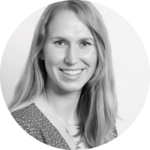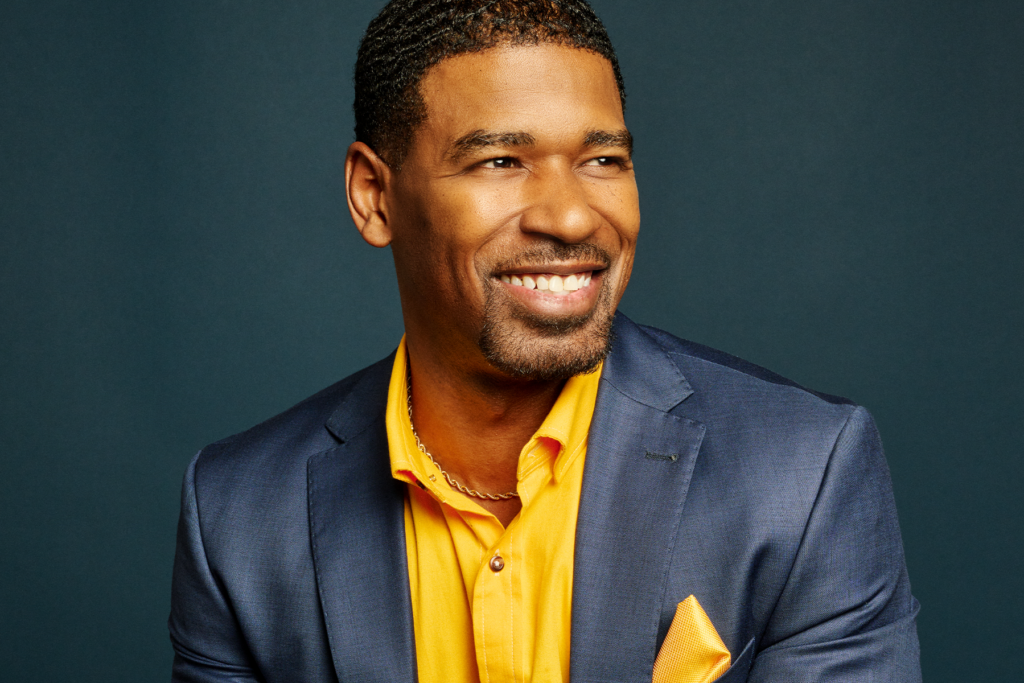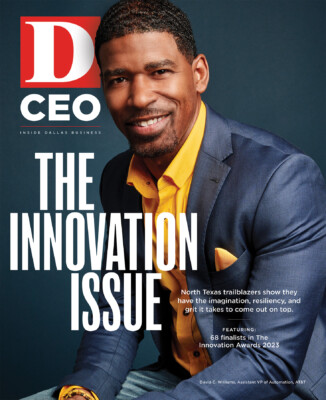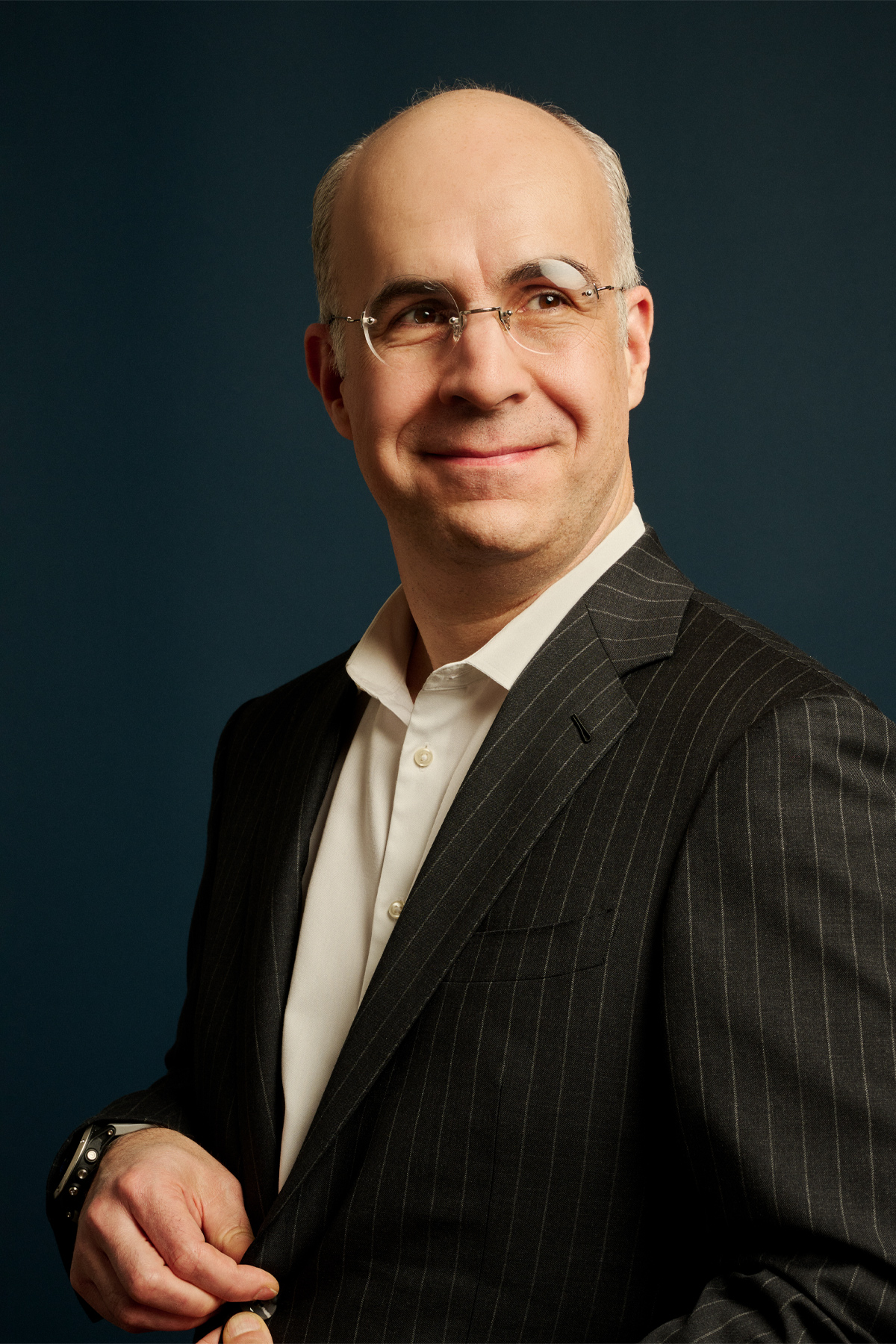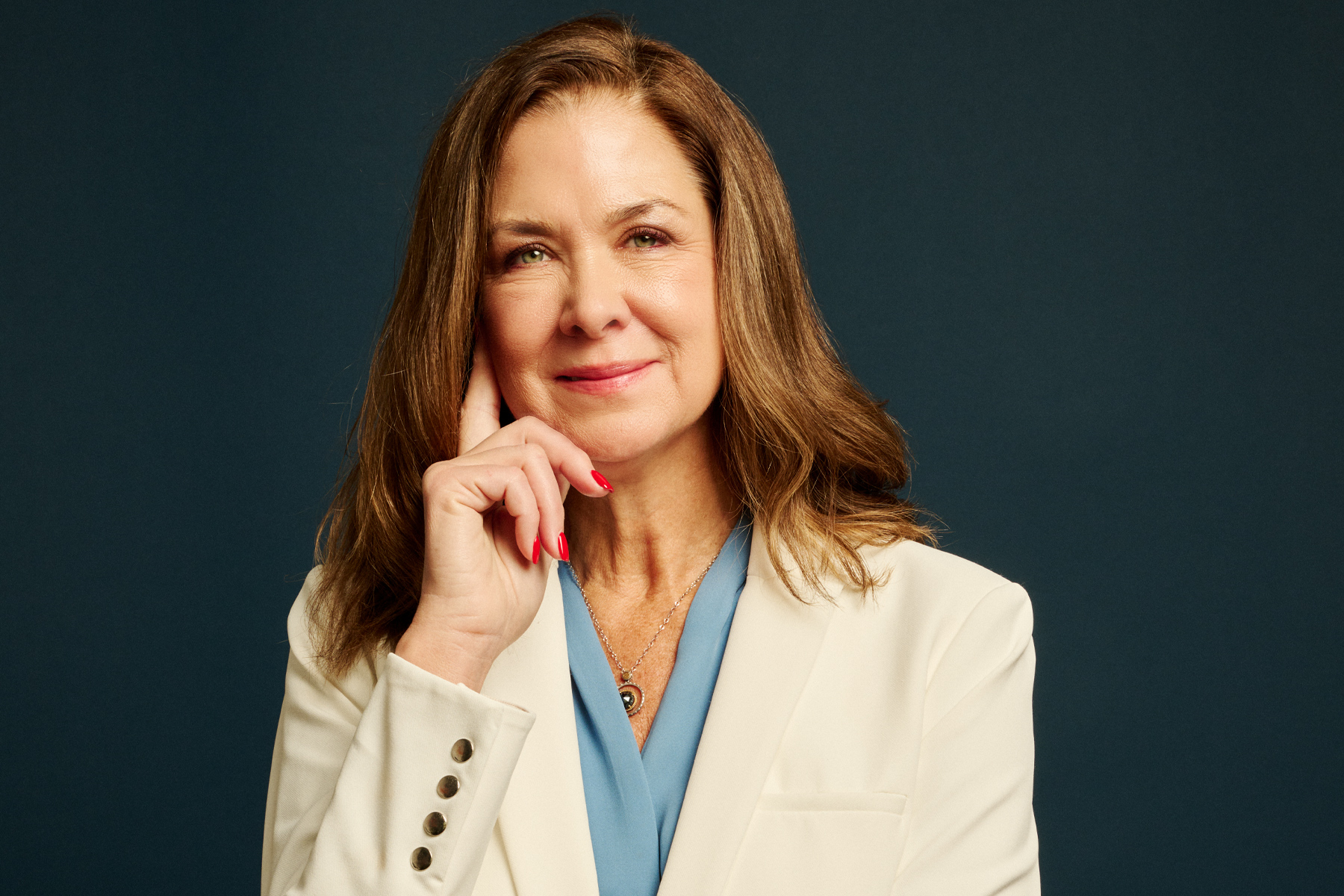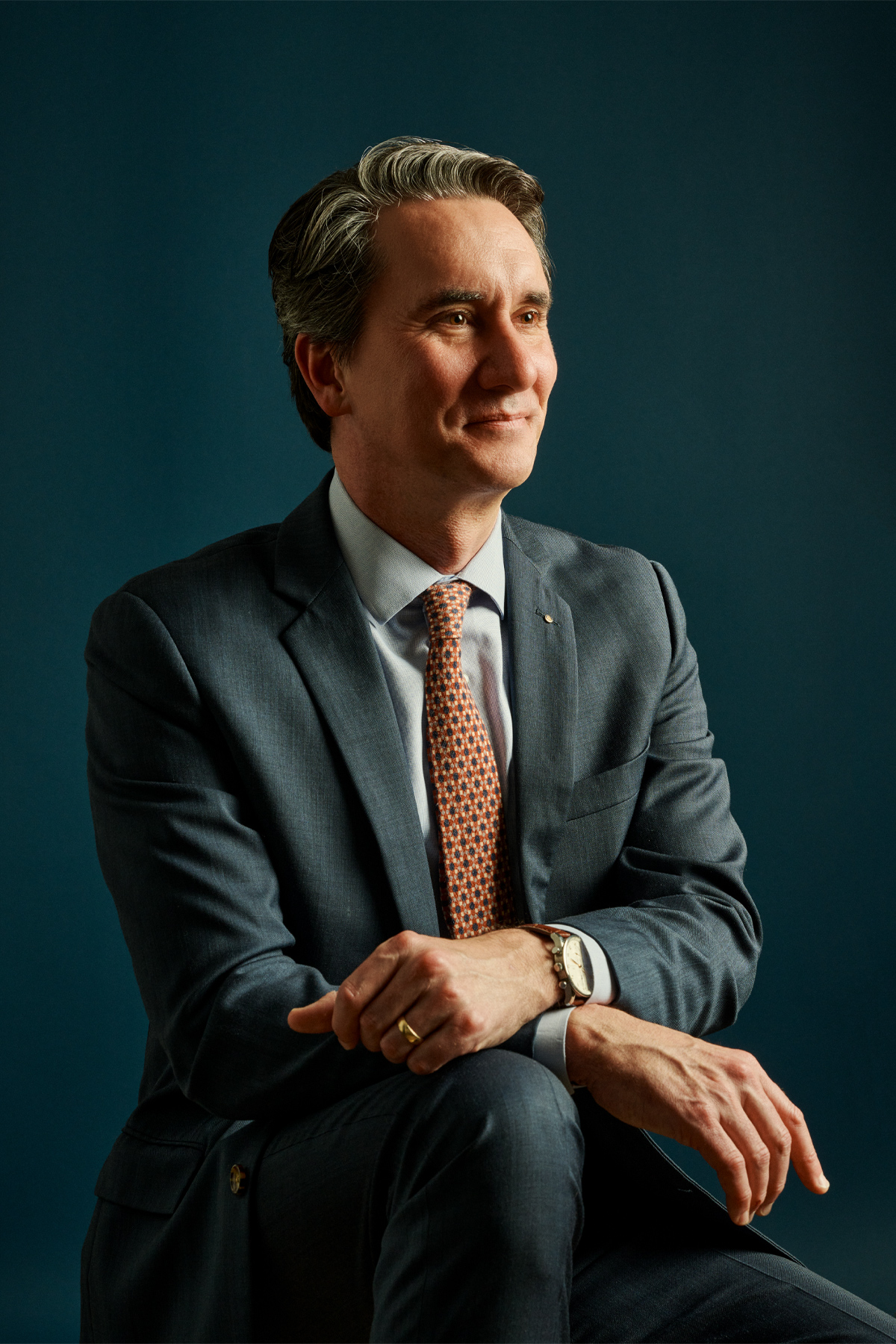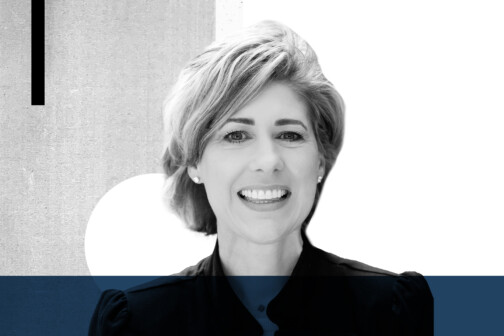The journey from “aha” moment to market launch is rarely linear. Obstacles in scaling, implementation, funding, and more abound, and an ability to adapt and stay the course is essential.
“Resilience is the ability to draw a straight line made up of crooked marks,” says Mance Harmon, co-founder of North Texas-based Distributed ledger tech company Hedera Hashgraph. He and the 67 other finalists and winners in The Innovation Awards 2023, presented by D CEO in partnership with Dallas Innovates, have shown many forms of resiliency throughout their journeys to creating products and technology that are shaping our future. The leaders have shown an ability to beat the odds, take risks, pivot, persist, and more. Here, you’ll read more about how our four individual category winners have defined and practiced resilience throughout their careers.
DAVID C. WILLIAMS, AT&T
“We grew up poor, just to put it out there,” David C. Williams says about his upbringing in South Dallas. The assistant vice president of automation for AT&T remembers his dad often challenging him to read extensively before he committed suicide when Williams was 8 years old. After that, Williams watched his mother and sister suffer financial, medical, and emotional hardship. “As a kid, so many people are taught how to make $1 out of 15 cents,” he says. “A dollar out of 15 cents is a 600 percent ROI, and if any of us could take that ingenuity that mama taught us for 18 to 20 years of our life and apply it in our careers, we could go do something amazing.”
That’s exactly what Williams has tried to do since high school, when he first realized there was nothing he couldn’t achieve with a little hard work. His sophomore year, he was left to lead an ROTC team whose former leaders all graduated. “I’m coming off a championship year, and I didn’t want to let anyone down,” Williams recalls. He threw himself into the effort—cleaning riffles, shining boots, pressing uniforms, and learning every drill move for every position on the team. “I just went to the nth degree, and I poured myself into that, and I think I haven’t changed since then,” he says.
After earning a marketing degree from Dallas Baptist University, Williams held several roles in operations for AT&T. With one hand, he says, he was learning the tasks of each role, and with the other, innovating to make each function easier and more efficient. “I started small, working on things that were close to me,” he says.
Williams rose to director level in 2014 and in 2020 solved one of the company’s biggest challenges: allowing customer service reps to work from home without exposing sensitive consumer information. “Although the government said, ‘Work from home or shelter in place,’ the FCC said, ‘That’s cool, but you can’t make a sale, because you can’t process a credit card or a social security number through home-based employees,’” Williams says. By repurposing a few app program interfaces, he created a way for customers to communicate sensitive information to 40,000 employees via a secure text channel that confirmed identity and processed payment, without the rep seeing any identifying information.
Now, as the leader of the largest robotics process automation program worldwide, Williams oversees roughly 150 employees who drive a 5,000 percent annual ROI. The team reached nearly $800 million in operating income for 2022—an astounding fivefold increase over 2021.
And Williams has no plans to slow down. He has an even bigger trick up his sleeve that will debut in spring 2023. “I figured out a way to drive out the non-efficient components of customer service and simplified it,” he says. He is quiet on specifics but says the project is in pilot mode in Houston and will begin scaling in the first quarter of the year. Williams believes it will quickly extend beyond customer service and even beyond AT&T. “The savings are too massive for any industry to avoid,” Williams says. “It is the greatest thing I’ve ever worked on in my entire career.”
ANDREW BENDER, DZS
“A journey of seeing the internet grow up.” That’s how Andrew Bender describes his career. The chief technology officer of Plano-based broadband connection company DZS left VMware, a multibillion-dollar global corporation, to take on his current role in 2020. “A lot of challenges, a lot of unknowns, and some risk factors there,” Bender says of the time when he made the leap of faith. “But to be honest, that background of uncertainty was everywhere.”
The task for Bender at DZS required moving some sizeable mountains: The company was transitioning its headquarters from the Oakland area in California, to Plano while ironing out the infrastructure needed to run a global company after nearly 20 years of growth through mergers and acquisitions. It would also be Bender’s first time in a C-suite seat. “Rebuilding, creating from scratch, making something new—that’s what we’ve done over the last two years,” Bender says, “and it looks like it’s working from a metrics perspective.” DZS reported net revenue of $107 million for Q3 in 2022.
While Bender was adjusting to his new role, demand for broadband connectivity was skyrocketing, with reliable internet becoming essential for remote learning, work from home, and more. “Many times, the network wasn’t ready,” Bender says. R&D without filled whiteboards and in-person collaboration became a must, and Bender’s team had to adapt.
“We had changed everything we did to keep the business running,” he says. “Resilience is how you navigate these changes, and success really depends on having a willingness to consider and devise new ways of doing things, because whether it’s the pandemic, or going from paper to digital, if you’re still in your horse drawn carriage, you’re not going to be part of the new society.”
Having helped society transition to new technology through his work at companies including Tekelec, NEC Corp., and Hewlett Packard—even working in early iterations of broadband technology at Manhattan-based ThruPoint during Y2K—Bender is now ready to help push the envelope again at DZS. The company recently completed a succession of product launches, including new hardware that transports hundreds of gigabits or terabits of bandwidth and a new transport switch system that aggregates traffic in multi-gigabit fiber optic networks. “Optical broadband going to gigabit, then multi-gigabit, and now 50-100 gigabit into everybody’s home is going to be possible over the coming years, making 5G a reality,” Bender says.
We had changed everything we did to keep the business running. Resilience is how you navigate these changes.”
Andrew Bender | DZS
Now, it’s time to help the community embrace these new products, while continuing to execute and innovate. “I think we can’t stop,” Bender says. “That’s really the expectation of our customers, and the industry, and the markets. Now, we still need to do some of the hard work of bringing those things into reality—helping customers operationalize, embrace, and implement the technology.” He adds, “It’s one thing to make a product, or a contraption, or demonstrate technology. It’s another to get it deployed out there on a national, or on a global, basis.” His forward focus? “Creating that software-driven network in a nutshell is what we’re going to be focused on for the next several years.”
TRICIA D’CRUZ, CATALYZE DALLAS
Early in her career as a software engineer, Tricia D’Cruz faced the possibility of the company she worked for going out of business. The now founder and managing director of holding company Catalyze Dallas was serving as software director for North Texas-based telecommunications firm Efficient Networks in the ’90s when flat ethernet cables hit the market, rendering the product her team was working on useless. “We were doing local area networking technology. It was called ATM to the desktop,” D’Cruz says. “You’ve never heard of that, because it’s not a thing anymore.”
Her team could have folded she says, but instead, they repurposed the tech toward high-speed internet. “That company ended up becoming world No. 1 market share position for the little box that goes in your closet for high-speed internet, based on the same technology that had failed originally,” D’Cruz says. Efficient Networks subsequently was acquired by Siemens for $1.5 billion in 2002, but not before D’Cruz led its products divisions through an IPO in 1999 and a two-year revenue explosion from $3 million to $200 million. She became president and general manager of Siemens’ Access Solutions division after the acquisition.
From there, D’Cruz held a division leadership role at Plano-based Tekelec, a global internet tech supplier, before founding and scaling numerous startups, and through her consulting firm VectorPoint helped high-tech companies grow. Having seen the scaling process through corporate and startup vantages, she realized she wanted to continue to bring new technology to market but “reduce risk and go fast.”
At the same time, D’Cruz and her husband, Joe, realized there was a lot of non-strategic intellectual property owned by corporations that did not wish to scale the tech they ideated. “They develop all sorts of really amazing technology, and some of it just doesn’t end up hitting the light of day through their processes for all sorts of different reasons, especially through M&A,” D’Cruz says. She realized if she could acquire tech at the go-to-market stage, she would be getting heavily tested products that could be brought to market quickly.
She began by acquiring an aerospace drag technology from Lockheed Martin, which she used to form Dallas-based Metro Aerospace in 2016. The company uses the tech to help commercial and military planes fly more effectively by reducing fuel consumption. It took only two months from the agreement with Lockheed Martin to first product launch. Three years later, D’Cruz formed Alpine Advanced Materials, a Dallas-based engineering firm that uses tech purchased from Lockheed to manufacture lightweight parts for planes.
Just as things were getting underway, the pandemic hit. “We had contracts underway with some really significant commercial aerospace manufacturers to develop product, and all of that vaporized,” D’Cruz says. But her team bounced back by focusing more on space and defense and less on air travel. Catalyze Dallas recently closed a deal with consulting giant IBM and spun-out Almaden Genomics in 2022, a company focused on making it easier to analyze the human genome. “I feel like we’re just hitting our stride, where we’re going to be starting companies on a on a more regular cadence,” D’Cruz says. “We have more capital to put to bear, so we can start some more capital-intensive projects as well. I’m super excited about what we will be doing in the next few years.”
HUBERT ZAJICEK, HEALTH WILDCATTERS
Austrian native Hubert Zajicek’s journey to U.S. citizenship was far from straightforward. He and his American wife showed up at the consulate in Vienna with two packed suitcases for his green card interview. In the bags were eight years of phone records, samplings from more than 100 letters, photo albums—every shred of evidence that he and his wife had to prove their multicultural marriage was real.
The now CEO of Dallas-based healthcare accelerator Health Wildcatters sailed through that part of the process. But then he experienced many challenges that, at one point, had him camping overnight at the Dallas INS office. After jumping through hoops, Zajicek finally got help from a congressman, just as the stamp on his passport was about to expire.
Nearly 20 years after immigrating, the M.D. put that same ingenuity and tenacity to work at NTEC, a Frisco-based healthcare incubator. There, he connected with three colleagues who wanted to create a space where healthcare entrepreneurs could grow and be mentored by investors with the hope of one day scaling their startups. “Accelerators had been around, but not those that specialized in a certain industry,” Zajicek says.
The four honed in on a sustainable model. “Corporations, economic development organizations, or universities, have entities that will push innovation further, and potentially even create startups, and that’s cool. But they are generally spending money doing that,” Zajicek says. Rather than a board or governing entity, the group relies entirely on funds from private angel investors, sponsors, and family offices to support their program. Investors also invest in founder or common shares, rather than preferred shares. This higher-risk investment helps build trust from the start. “We put ourselves in the same shoes as these startup entrepreneurs on purpose,” Zajicek says. “We raised our first fund, and off we went.”
In the past decade or so, Health Wildcatters has accelerated an impressive 99 startups, that have raised a quarter billion dollars total, and seen some of its alumni go on through successful exits and a Nasdaq IPO. The latter came from Dallas-based Lantern Pharma, a biopharmaceutical company focused around clinical-stage oncology. It raised $26.3 million when it went public in 2020 and now has a market cap of more than $55 million.
Christopher Crow, leader of Plano-based Catalyst Health Network, Dave Copps, co-founder and CEO of North-Texas AI startup Worlds, Elyse Dickerson, co-founder and CEO of Fort Worth earcare company Eosera, and Lea Ellermeier, founder and CEO of several dental startups in North Texas, are among curent mentors at Health Wildcatters. Zajicek says the process builds trust and resiliency, with investors having to trust that a return will be coming and entrepreneurs needing to trust in the mentorship and guidance that they receive, knowing funding may be difficult to secure. “In the startup life, you’re going to have to knock on many doors to get the check,” Zajicek says. “They have to understand that they cannot let those things get to them.” He’s optimistic about the future, even in the face of a potential recession. “I’m fairly bullish on the fact that the people who invest in private deals understand that it’s a long term play,” he says.
Get the D CEO Newsletter
Author
